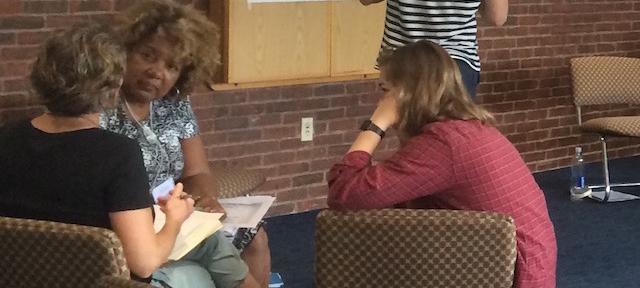Hampshire Invites Campus Community to Radically Engage

Hampshire is inviting students and employees to take part in an experiential, story-driven week of “radical engagement,” led by professional trainers visiting from Los Angeles-based The Relational Center, one of them a Hampshire alum.
Hosted by the Ethics and the Common Good Project in partnership with more than two dozen offices across campus, the program invites participants to engage in strengthening relationships in our community through the free workshops and events titled The Culture of Radical Engagement offered the week of February 21 (registration links below).
The week-long residency is led by trainers Cedar Landsman, Hampshire 99F, and Lucien Demaris, visiting from The Relational Center in Southern California. The mission of The Relational Center is to lead a shift in culture within communities to one that values empathy, inclusion, and interdependency. The Center has provided training and capacity-building to schools, community groups, activist organizations, and nonprofits seeking leadership development and strategic planning.
In describing the workshops, Landsman said, “We’ve developed this training because we see and hear the need for it. The purpose is to support people to nurture a humanizing and inclusive culture. Many organizations and communities have those ideals, but don’t know how to go about doing it without the history or tools for it.”
Hampshire’s week-long residency has been in development since last summer and was piloted with a campus training session in August. In designing the residency, the trainers worked closely with the Ethics and the Common Good staff and a seed team representing Hampshire faculty, staff and students, to address the College’s unique community and needs.
Landsman observed, “With all the ways it’s an amazing community, Hampshire has the same challenges as many institutions – people can get siloed in their own programs.” Javiera Benavente, director of Ethics and the Common Good, added that Hampshire students, staff and faculty have acknowledged a culture of individualism on campus that is reinforced by the academic structure.
As a Hampshire alum with intimate experience of Hampshire, Landsman believes this residency will benefit the College community, in that its approach supports community building and organizing. Together with Lucien Demaris, a somatics-based healer, educator and activist, they have developed their leadership training program to deliver to communities across the country. Landsman elaborated, “American society promotes independence, viewing self-sufficiency as the ideal state. Relational philosophy on which our training is based draws on ecology. We teach that, interdependence is what gives life and support to thriving diverse communities. We need to promote a healthy culture of supporting one another. We need to reclaim interdependence as a real core human value and practice.”
The goal is to develop collaborative leadership skills among students, staff and faculty, added Benavente. “This is a form of leadership development aimed at building our collective capacity to strengthen relationships and address our challenges. Our aim is a campus that supports all its members by promoting an inclusive, empathic, interdependent culture and relationships.” Among its goals, the training is designed to facilitate a move away from isolated leadership and toward shared leadership.
Landsman has been a community organizer for 15 years, beginning as an activist in the global justice and anti-war movements during her time at Hampshire. Over the past decade she has worked in Los Angeles in the low-wage labor movement, food justice movement, and has developed a youth leadership training based on relational practice. After Hampshire, Landsman earned masters degrees in urban planning and Latin American Studies from UCLA and a certificate in Leadership in Sustainability.
The Culture of Radical Engagement workshops and events are being offered to students, staff, faculty and administrators on Monday through Thursday Feb. 22-25, culminating with a day-long convening on Friday Feb. 26 for participants to deepen the skills and connections built throughout the week.
Registrants are invited to sign up for the following workshops:
- For all students, Monday or Thursday evenings,
- For Div III students, Wednesday evening,
- For staff, mid-day on Tuesday,
- For faculty, mid-day Wednesday,
- Participants of the Monday-Thursday sessions are invited to a day-long convening all day on Friday and an all-campus celebration in the evening,
- Everyone on campus is also invited to sign up for a Relational Somatics session to experience a relational movement exercise on Wednesday morning.
For more information, visit http://bit.ly/CREInfo
Space is limited. To register, visit http://bit.ly/RegisterforCRE
In addition to the workshops, the trainers will give a public presentation on Tuesday evening in Franklin Patterson Hall Main Lecture Hall, and will lead sessions for upper level administrators, community partners, community engagement staff, and first-year students in the “Community Engagement for Social Change” Living Learning Community.
Landsman said she finds it “affirming and very humbling” to be invited back to campus to lead a program she has co-developed, one that she cares deeply about and thinks is relevant to addressing societal challenges. She wants people on campus to know these workshops offer an opportunity for them to experience their community in a new way, and to potentially practice deep, rich conversations about some of the real challenges people are facing, in a space that will honor that exploration. “We hope it will be enriching and powerful for those who take part,” she said.
Hampshire alum Teal Van Dyck, Project Coordinator, Ethics and Common Good Project, added the residency gives Hampshire a chance to develop a model of collaborative, equitable leadership. “Participants will gain skills for a new style of leadership they can cultivate throughout the campus, the community, and in the larger world,” they said. “We are developing empathic leadership.”
About Ethics and the Common Good
Hampshire College launched its Ethics and the Common Good project a year ago in February, 2015, to provide a model for integrating a deliberate focus on ethics within an educational institution, with a distinctive focus on contributing to the common good.
The Project provides a range of programs including courses, paid internships, research support, and other resources for students from all academic disciplines who want to develop critical thinking skills and to practical leadership skills, and to understand core ethical beliefs around their own actions and those of organizations and institutions. The project includes new interdisciplinary academic offerings in applied ethics and practice-based leadership initiatives.
The project was established by a $2 million grant over five years from SHIFT, a private family foundation dedicated to advancing the culture of common good. The project arose from the donors' belief that deep cultural change, which shifts attitudes and understanding, is needed if real systemic, economic, and social change is to happen.
REFERENCE LINKS
https://www.hampshire.edu/ecg/ethics-and-the-common-good-project
https://www.hampshire.edu/news/2015/01/26/hampshire-college-to-launch-leadership-and-ethical-engagement-project



